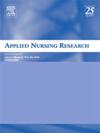The impact of psychological resilience on professional commitment among caregiving students in Taiwan: A cross-sectional study
IF 2.2
4区 医学
Q1 NURSING
引用次数: 0
Abstract
Aim/objective
To explore the impact of psychological resilience and its dimensions on professional commitment among caregiving students in Taiwan.
Background
Professional commitment is crucial in caregiving professions, yet its relationship with psychological resilience among caregiving students in Taiwan remains underexplored. Understanding this relationship can guide educational strategies to enhance students' professional commitment.
Design
A cross-sectional study was conducted.
Methods
The study included 258 students from 23 colleges specializing in caregiver programs in Taiwan in 2021. A stratified random sampling method was used. Data were collected using the Resilience Scale for Adults (measuring dimensions like personal strengths, social resources, and family resources) and the Professional Commitment Scale. Validity and reliability were confirmed through expert review, item analysis, exploratory factor analysis, and internal consistency analysis.
Results
Personal strengths emerged as the strongest predictor of professional commitment (β = 0.26), followed by participation in extracurricular activities (β = 0.13). Background factors such as college type and experience in campus club explained 13 % of the variance in professional commitment (adjusted R2 = 0.13). Future organizational style, family resources, and personal strengths explained an additional 2.0 %, 2.0 %, and 3.0 % of the variance, respectively, leading to a total explanatory power of 24.0 %.
Conclusions
To improve caregivers' future professional commitment, it is recommended that caregiving programs focus on enhancing students' psychological resilience and encourage their participation in extracurricular activities.
台湾护生心理弹性对专业承诺之影响:横断面研究。
目的:探讨台湾护生心理弹性及其维度对专业承诺的影响。背景:专业承诺对护理专业至关重要,但其与台湾护理学生心理弹性的关系仍未被充分探讨。理解这种关系可以指导教育策略,提高学生的专业承诺。设计:采用横断面研究。方法:选取2021年台湾省23所护理专业院校258名学生为研究对象。采用分层随机抽样方法。数据采用成人弹性量表(测量个人优势、社会资源和家庭资源等维度)和专业承诺量表收集。通过专家评审、项目分析、探索性因子分析和内部一致性分析来确定效度和信度。结果:个人优势是职业承诺的最强预测因子(β = 0.26),其次是课外活动的参与(β = 0.13)。大学类型和校园社团经历等背景因素解释了13%的专业承诺方差(调整后R2 = 0.13)。未来的组织风格、家庭资源和个人优势分别解释了额外的2.0%、2.0%和3.0%的方差,导致总解释力为24.0%。结论:为了提高照顾者未来的职业承诺,建议照顾项目应注重增强学生的心理弹性,并鼓励他们参与课外活动。
本文章由计算机程序翻译,如有差异,请以英文原文为准。
求助全文
约1分钟内获得全文
求助全文
来源期刊

Applied Nursing Research
医学-护理
CiteScore
4.50
自引率
0.00%
发文量
65
审稿时长
70 days
期刊介绍:
Applied Nursing Research presents original, peer-reviewed research findings clearly and directly for clinical applications in all nursing specialties. Regular features include "Ask the Experts," research briefs, clinical methods, book reviews, news and announcements, and an editorial section. Applied Nursing Research covers such areas as pain management, patient education, discharge planning, nursing diagnosis, job stress in nursing, nursing influence on length of hospital stay, and nurse/physician collaboration.
 求助内容:
求助内容: 应助结果提醒方式:
应助结果提醒方式:


